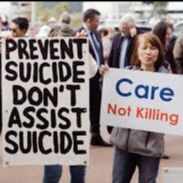Alex Schadenberg
Executive Director, Euthanasia Prevention Coalition
Andrew Messenger reported on September 25 for the Guardian:
Queensland’s health minister has suggested the state may need to strengthen voluntary assisting dying (VAD) legislation after a woman’s euthanasia drugs were used by her husband after she died in hospital.
The coroner is investigating the reported incident, in which the elderly woman was approved to use the drugs at home under Queensland’s voluntary assisted dying scheme – but she died suddenly in hospital. Her husband subsequently used the drugs to kill himself.
According to Queensland law, unused lethal assisted suicide drugs are to be returned 14 days after a person's death. In this case a husband, whose wife had been approved for assisted suicide, consumed the lethal drugs.
Queensland's Health Minister, Shannon Fentiman, admits that this may have been the first time the law has been abused.
Fentiman states:
“We will look at absolutely whether we need to strengthen the legislation about that 14-day turnaround for medication to be returned, which I suspect we will do,” she said.
“But we’re going to await the outcomes of that investigation. That investigation will also go to the coroner and I also expect the coroner will have some recommendations around that.”
An ABC News report by Rachel Riga published in September 25 states:
The ABC understands the man's wife had met the criteria and had been given the medication but she was admitted to hospital.
She passed away in hospital before taking the VAD substance.
Her husband was required to return the medication within 14 days but consumed it instead.
Messenger reported that even though the abuse of the new law has resulted in a death, Health Minister Fentiman is recommending that euthanasia be offered through telehealth:
It also recommended amendments to the commonwealth criminal code to permit doctors to use telehealth for VAD consultations. The code is perceived to prohibit electronic transmission of prescriptions for a substance under the scheme.
Fentiman said more Queenslanders had taken up the option than in any other jurisdiction, and there had been almost no errors in the scheme’s first year.
She said the report showed the state’s system is “safe, accessible and compassionate”.
Those who oppose killing argue that legalizing euthanasia results in errors and premature deaths; euthanasia promoters respond by saying "there will be safeguards". When a person, who was not approved for assisted suicide, dies by taking another person's lethal drugs, the euthanasia promoters say there were "almost no errors."
Society needs to care not kill people.


No culprit, no charge, no prosecution. The easy way out for the Queensland government.
ReplyDelete(I just read the post that "Euthenasia is impossible to police once legalized.")